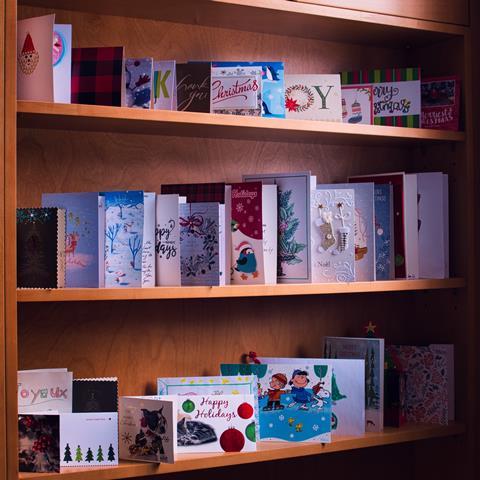Do you still send Christmas cards, or wonder what is the point? Rachel Allcock takes a look at where the tradition comes from, and asks if is worth keep it going.

I’ve hardly received enough cards to fill the mantlepiece (not that I would, as I get sick of them blowing down whenever someone breezes past in their oversized hoodie).
Along with the shrinking Roses tin and the availability of supermarket delivery slots, this sparsity of Christmas cards has become a talking point. I used to feel it reflected badly on the younger generation – too lazy or tight to write and send cards. Older relatives cherish cards, and I think it’s important to maintain this habit for them. However, four things about modern-day friendship make card sending awkward and clunky. Here are a few reasons why I’m no longer adding to my Christmas card list from 1995.
1. I don’t want or need to prove my social standing
One hundred and eighty years ago, a busy businessman sent printed Christmas cards because he didn’t have time to write individual notes. The concept took off, with the middle classes using them to display their wealth and social standing.
The first charity Christmas card was mailed in 1949, and according to Country Life, it’s estimated that charity cards raise £50 million for UK charities today.
At my most stretched, with new babies and lots of birthdays around Christmas, not only was I sending out birth announcements and thank you notes, I was running on very little sleep and plenty of tears! The pressure to get dozens of cards out on time is a burden I’d happily take away from others in crazy seasons of life!
2. I’d rather donate to charity
The first charity Christmas card was mailed in 1949, and according to Country Life, it’s estimated that charity cards raise £50 million for UK charities today. This seems a great argument favouring continuing to buy multipacks from your chosen charity. However, having just struggled through a fundraising campaign at work, I’m more aware of the pressure to donate at this time of year. Maybe saving £40 on stamps and sending the money to a Crowdfunder project also leaves you with a few extra hours to volunteer at a festive event or visit a few people you said you would ‘in the new year’.
3. I sent them a meme yesterday, so what more is there to say?
One of our favourite pastimes (scrolling Instagram and sending reels to our friends) is keeping us in contact more than before. A shared joke or quick message keeps us from feeling isolated and means more than an annual card reminding us that we never did make a date to meet in 2023.
But handing them out feels exclusive (when there isn’t one for everyone), or tokenistic (when there is).
4. Where do we put them?
With people keeping their phones in their back pockets and using Apple Pay and You Version Bibles, handbags have become a thing of the past! Where will your friend put that card you hand to them at a party or in a church foyer? I still see the point in sending a few through the post, especially if they’re handmade or include personal messages. But handing them out feels exclusive (when there isn’t one for everyone), or tokenistic (when there is). With many soon-to-be-marrieds at my church, I’ve witnessed the awkward hand-delivery of invitation cards to some people and not others. Awkward! Why recreate this when it’s non-essential?
Read more on Christmas
Well known Christians reflections on Christmas
Why safe housing is the best gift for sexually exploited women this Christmas
‘It’s nearly Christmas again and I still haven’t washed the Christmas tablecloth’
Having said all this, I know of amazing people whose card-sending capabilities have been fruitful, encouraging, and hugely welcomed. My parents-in-law became Christians thanks to a wonderful couple who welcomed foreign students into their homes every Sunday. Many of those students went on to become powerful leaders and businesspeople worldwide. Vic and Marion Salmons sent hundreds of Christmas cards yearly, with Bible passages, poems, and personal notes to all these grown-up students and each of their children – all addressed by name. Those cards were always the first to arrive, and the love that went into writing them brought tears to my eyes despite the fact I’d never met them.
Of course, Christmas cards also offer an opportunity to remind people of the real reason for Christmas. Although a nativity scene and Bible verse may not be as effective as a vibrant friendship with a Christian, they’re probably an important way to communicate God’s love to those isolated or far away.
Before I’m written off as a Scrooge, I’d like to point out that there will always be a select number of people on my Christmas card list, and I’m not going to be the first to cause a stir in the neighbourhood by neglecting those obligatory card deliveries. However, I still relish the more recent friends, friends-for-a-season, and nameless acquaintances who won’t make it on any list!

































1 Reader's comment